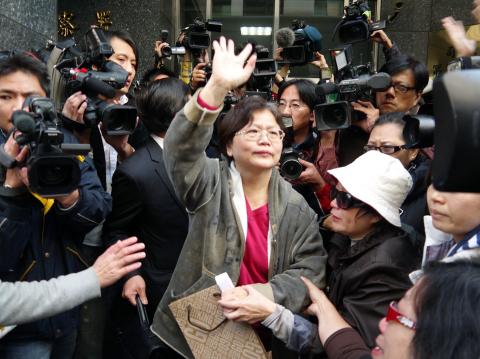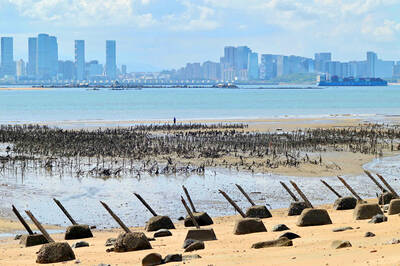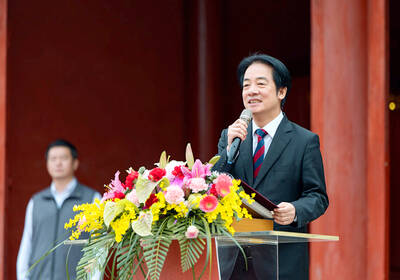Insisting that she was unjustly declared guilty of corruption and vowing to fight to clear her name, former minister of transportation and communications Kuo Yao-chi (郭瑤琪) bade a tearful farewell to her supporters yesterday morning as she headed off to Taoyuan Women’s Prison.
Chanting “Stop the political persecution” and “The minister is innocent,” a crowd of former colleagues and supporters greeted Kuo as she stepped out of her car to report to the Taipei District Prosecutors’ Office before being sent to prison.
Kuo was accused to taking an US$20,000 bribe from Nanrenhu Co (南仁湖集團) for a Taipei Railroad Station redevelopment project during her term as minister and sentenced to eight years in prison.

Photo: Lin Chun-hung, Taipei Times
“On Jan. 8, 2014, I am going into prison. This is something I’ve never thought would happen during my life as a law-abiding civil servant,” Kuo told reporters waiting outside of the prosecutors’ office.
“I believe that a lot of people still think that I actually took US$20,000 in bribes, but those who are so convinced must have not read the written verdict, and the evidence on which the judge based his sentence,” she said.
Kuo said she never confessed to the charges even though there were many media reports citing prosecutors as saying that she has admitted them.
“The judge sentenced me to eight years in prison based on the testimony that I accepted bribes given to me in tea canisters,” she said.
“If you watch the video recording of the witness’ testimony, you will see that the witness was not clear about the size or color of the cans, or what the cans were made of,” she said.
“The judge failed to track the cash flow of the so-called ‘bribe,’ and the numbers of the banknotes that the witness cited are different from banknotes found in my home,” Kuo said. “In addition, Nanrenhu never bid on the Taipei Railroad Station redevelopment project.”
However, Kuo said she has learned that a court could sentence an innocent person to eight years in prison without any hard evidence and the Supreme Court could overturn a not-guilty ruling without reviewing the evidence submitted by the defendant.
“I am going to jail, but my lawyer and my loved ones will continue to fight for my innocence,” she said.
After speaking to reporters, Kuo walked into the prosecutors’ office escorted by supporters and her former colleagues, including former deputy minister of transportation and communications Hochen Tan (賀陳旦) and former Overseas Compatriot Commission minister Chang Fu-mei (張富美).
Each gave her a hug before saying goodbye.

THREATS: Naval facilities have been built in Shanghai and Zhejiang, while airbases have been expanded in Xiamen, Fuzhou and Zhangpu, across the Strait from Taiwan The Chinese Communist Party (CCP) is building large-scale military infrastructure at five sites along the eastern coast of China, the Mainland Affairs Council (MAC) said in a recent report. The latest issue of the council’s Mainland China Situation Quarterly said satellite photos showed military infrastructure such as air force and naval bases being constructed along the eastern coast of China. That means the CCP might be preparing for potential conflict in Taiwan, it said, adding that there are five such construction sites from north to south. A naval base has been built in Shanghai’s Pudong New Area, with underground oil storage tanks, railway

MILESTONE: The foreign minister called the signing ‘a major step forward in US-Taiwan relations,’ while the Presidential Office said it was a symbol of the nations’ shared values US President Donald Trump on Tuesday signed into law the Taiwan Assurance Implementation Act, which requires the US Department of State to regularly review and update guidelines governing official US interactions with Taiwan. The new law is an amendment to the Taiwan Assurance Act of 2020 focused on reviewing guidelines on US interactions with Taiwan. Previously, the state department was required to conduct a one-time review of its guidance governing relations with Taiwan, but under the new bill, the agency must conduct a review “not less than every five years.” It must then submit an updated report based on its findings “not later

GIVE BACK: The president thanked immigrants, recounting heartwarming stories, from a gymnast helping athletes shine internationally to a spouse helping the disadvantaged There is no need to amend the law to exempt Chinese spouses from single allegiance to the Republic of China (ROC), President William Lai (賴清德) said yesterday, adding that such changes would only increase the public’s doubts toward new residents from China and would not improve social harmony. Taiwan is a democratic, diverse and free country, he said. “No matter which ethnic group you belong to, where you come from or when you arrive, as long as you identify with Taiwan, you are masters of this country,” he said. Taiwan is a democratic nation that follows the rule of law, where immigrants are

A trial run of the north concourse of Taiwan Taoyuan International Airport’s new Terminal 3 is to commence today, the Ministry of Transportation and Communications said yesterday. The eight additional boarding gates would allow for more aircraft parking spaces that are expected to boost the airport’s capacity by 5.8 million passengers annually, Deputy Minister of Transportation and Communications Lin Kuo-shian (林國顯) said. The concourse, designed by a team led by British architect Richard Rogers, provides a refreshing space, Lin said, adding that travelers would enjoy the tall and transparent design that allows sunshine to stream into the concourse through glass curtain walls. The